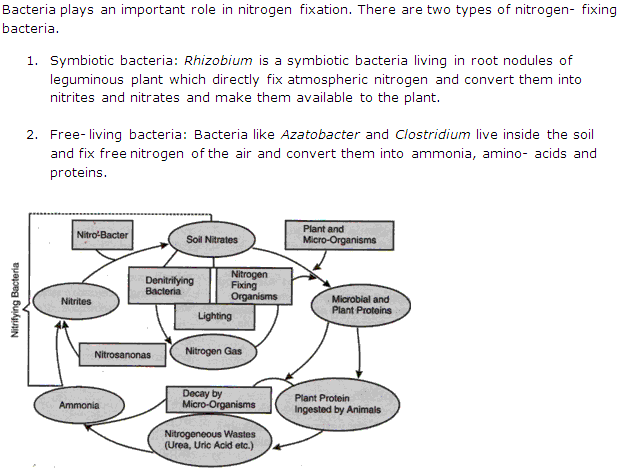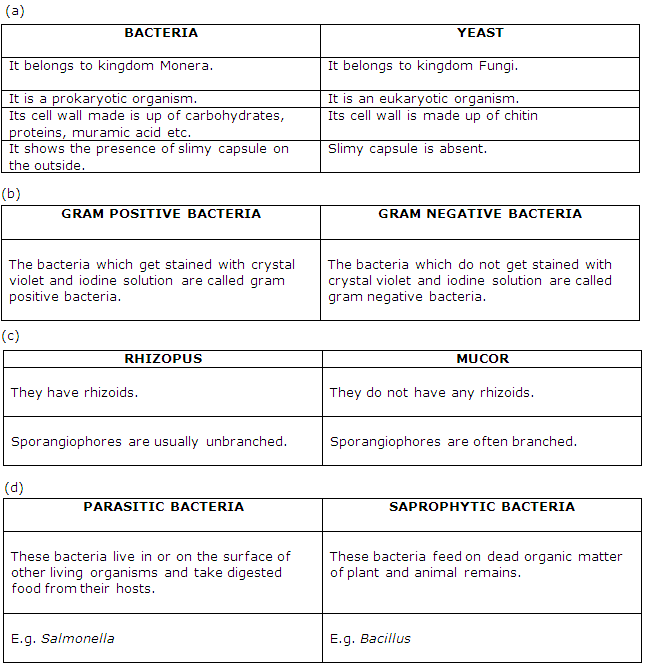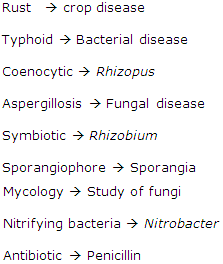Class 9 FRANK Solutions Biology Chapter 14: Bacteria and Fungi: Their Importance
Get Frank Solutions for ICSE Class 9 Biology Chapter 14 Bacteria and Fungi: Their Importance on TopperLearning. Prepare for your exam by revising important concepts such as gram-positive bacteria, fungi, yeast and more. Learn to draw and explain the working of a bacterial cell with the aid of our expert solutions.
Apart from Frank solutions, our study portal also features free Selina solutions for ICSE Class 9 Biology that you can access 24x7. To increase marks, you can improve your answering abilities with our mock question papers and video lessons. Utilise our ‘UnDoubt’ section to further help you resolve your doubts regarding important chapter concepts.
127
128
Bacteria and Fungi: Their Importance Exercise 127
Solution 1
(a) Bacteria are a large group of unicellular, prokaryotic microorganisms.
(b) The bacteria which do not get stained with crystal violet and iodine solution are called gram negative bacteria while those bacteria which get stained with crystal violet and iodine solution are called gram positive bacteria.
(b) The bacteria which do not get stained with crystal violet and iodine solution are called gram negative bacteria while those bacteria which get stained with crystal violet and iodine solution are called gram positive bacteria.
Solution 2
(a) Bacteria shows the presence of cell wall, hence they are included under plants.
(b) Spore formation helps bacteria to survive during adverse environmental conditions. Hence it is a survival technique.
(c) Bacteria as friends :
Bacteria are useful to us in many ways like producing antibiotics, forming curd and cheese, tanning leather, producing various industrial products, nitrogen fixation, digesting cellulose etc.
Bacteria as foes:
They are harmful in many ways like causing diseases, bio-weapons , food spoilage etc.
(d) Yeast is used in breweries since the fermentation activity of yeast produces different types of beverages like wine, beer, alcohol toddy etc. In bakeries, when yeast is added to the flour its fermentation results in the production of carbon dioxide which produces soft bread and other bakery products.
(b) Spore formation helps bacteria to survive during adverse environmental conditions. Hence it is a survival technique.
(c) Bacteria as friends :
Bacteria are useful to us in many ways like producing antibiotics, forming curd and cheese, tanning leather, producing various industrial products, nitrogen fixation, digesting cellulose etc.
Bacteria as foes:
They are harmful in many ways like causing diseases, bio-weapons , food spoilage etc.
(d) Yeast is used in breweries since the fermentation activity of yeast produces different types of beverages like wine, beer, alcohol toddy etc. In bakeries, when yeast is added to the flour its fermentation results in the production of carbon dioxide which produces soft bread and other bakery products.
Solution 3

Solution 4

Solution 5

Bacteria and Fungi: Their Importance Exercise 128
Solution 6

Solution 7
(a) Penicillium notatum
(b) Aspergillus fumigatus
(c) Candida albicans
(d) Aspergillus
(b) Aspergillus fumigatus
(c) Candida albicans
(d) Aspergillus
Solution 8
(a) chitin
(b) saprophytic
(c) obligate aerobes
(d) Agaricus campestris
(b) saprophytic
(c) obligate aerobes
(d) Agaricus campestris
Solution 9

Solution 10
Fungi are cooked like vegetables or used in pulao or prepared as soups. Some common edible fungi are Agaricus, Ramaria, Clavaria, Morchella.
Also yeast is used in preparing idli and dosa from a mixture of powdered rice and dal.
Also yeast is used in preparing idli and dosa from a mixture of powdered rice and dal.
Solution 11
Yes. Many types of antibiotics are obtained from fungi which are used in medical sciences. Today about 25 types of antibiotics are commercially produced from moulds.
For example: Penicillin is obtained from the fungus Penicillium notatum.
Griseofulvin is extracted from the fungus Penicillium griseofulvum.
For example: Penicillin is obtained from the fungus Penicillium notatum.
Griseofulvin is extracted from the fungus Penicillium griseofulvum.
Solution 12

Solution 13
(i) (b) Leeuwenhoek
(ii) (a) bacteria
(iii) (b) Bacillus
(iv) (a) Tuberculosis
(v) (d) Rhizobium
(vi) (b) Lactobacillus
(vii) (d) Agaricus
(viii) (a) ethyl alcohol
(ii) (a) bacteria
(iii) (b) Bacillus
(iv) (a) Tuberculosis
(v) (d) Rhizobium
(vi) (b) Lactobacillus
(vii) (d) Agaricus
(viii) (a) ethyl alcohol
